Cover: Picture of St. Camillus and his first companions, kept at the Generalate House of the women Ministers of the Sick (Rome)
THE MOTU PROPRIO ‘MAIOREM HAC DILECTIONEM’AND THE HOLINESS OF CAMILLIAN CONSECRATION
di p. Pietro Magliozzi
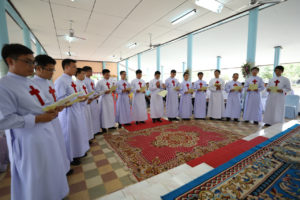 The Relationship between this Document of the Magisterium and the Fourth Vow of the Camillians
The Relationship between this Document of the Magisterium and the Fourth Vow of the Camillians
On 11 July 2017 Pope Francis signed the Motu Proprio Maiorem hac dilectionem on offering one’s own life for others persevering unto death as a means of achieving canonical holiness. This perfectly reflects the words of the Camillian consecration ‘and I promise to God that I want to serve the sick even at the risk of my life’.[1]
This Motu Proprio begins with a quotation from John 15:13 ‘Greater love has no man than this, that a man lay down his life for his friends’ and observes that voluntarily and freely offering one’s life for others, persevered with unto death, is a ‘true, complete and exemplary’ imitation of Christ and thus deserves to be admired and imitated. This offering of one’s own life thus becomes a ‘means’ by which to achieve the goal of every Christian – holiness.
For this reason, Pope Francis (cf. art 1) adds to the two prior conditions for beginning the procedure of beatification and canonisation,[2] namely martyrdom (red martyrdom) and the heroism of virtues (white martyrdom), also the ‘offer of life’ (cf. art. 3). This phrase ‘offer of life’ is explained in article 2 of the Motu Proprio: ‘a free and voluntary offer of life and heroic acceptance propter caritatem of a certain and untimely death’. What is this offer if not the fourth vow of the Camillians which led more than 300 religious to the martyrdom of charity?
SOME REFLECTIONS ON THE FATEBENEFRATELLI AND BIOETHICS
di p. Leocir Pessini
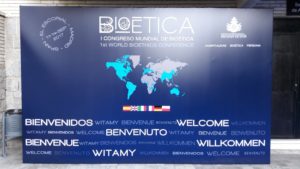 On 11-14 September of this year I had the privilege to take part as a listener, and the only Camillian, in the First World Congress of Bioethics organised by the Fatebenefratelli in Spain, in the historic setting of San Lorenzo del Escorial, the famous and imposing monastery founded by King Phillip II as a large pantheon for the kings and queens of Spain.
On 11-14 September of this year I had the privilege to take part as a listener, and the only Camillian, in the First World Congress of Bioethics organised by the Fatebenefratelli in Spain, in the historic setting of San Lorenzo del Escorial, the famous and imposing monastery founded by King Phillip II as a large pantheon for the kings and queens of Spain.
This event had as its central theme ‘Hospitality, Bioethics and the Person’. I experienced this event as a very beautiful moment to learn about a charism that is very similar to our own, from closer to hand: a charism which makes its presence felt in the world of health and health care. It was a valuable opportunity to encounter and meet many religious and to perceive how a philosophy of life, ethical values, and bioethical approaches can be transmitted and lived inside the apostolic works and the activities of the Hospitaller Order of St. John of God.
This congress witnessed the participation of about 500 people of 25 different nationalities: members of this Hospitaller Order (religious brothers, co-workers and students), but also professionals or students interested in the questions and issues of bioethics. This Hospitaller Order has always paid great attention to the contributions of this new discipline, taking advantage of its ideas and creating promising synergies between its contents and the processes that are now underway, with the optimal development of a model of care inside its own health-care institutions. ‘Bioethics’ is a concept/reality in which this Hospitaller Order has always felt very involved: this is the experience that many participants repeated during the different stages of the congress. It was a congress appreciated by everyone: prepared with precision and carried out with style, in the organisation of both the timetable and the subjects, which were addressed with humanity and professionalism.
CONTRIBUTO della ‘SALITA’ di san Giovanni della Croce ALLA PASTORALE DELLA SALUTE. RESILIENZA E PURIFICAZIONE
di fr. José Carlos Bermejo
 Negli ultimi anni, nel contesto degli studi e delle ricerche di psicologia e di spiritualità, si parla di resilienza come possibilità per lo sviluppo e la crescita personale nella fragilità e nella sofferenza, nei traumi della vita. Una proposta o una chiave esistenziale densa di speranza. Non è un atteggiamento passivo verso la sofferenza, di rassegnazione, ma piuttosto un impegnativo lavoro su sé stessi e l’accoglienza di un accompagnamento, nonché la coltivazione di risorse interne (tra le quali la fede), per essere protagonisti nella sofferenza. San Giovanni della Croce, nella sua Salita dà particolare importanza alla gestione della memoria, fonte di sofferenza o fattore protettivo di resilienza. Liberare la memoria, apre la strada alla speranza. La sete e la passione per Dio si dinamizzano internamente nella sofferenza. Il loro sguardo del cuore – complementare a quello del corpo e della mente – ci permette di cogliere nuove possibilità per la salute, decentrandosi e liberando il cuore dal rimpianto. Ma la resilienza non è solo un atteggiamento individuale. Influisce in essa anche il significato attribuito alla sofferenza. San Giovanni della Croce si dimostra consapevole di tale significato, influenzato dal contesto culturale, ma soprattutto dall’adesione personale alla Croce. L’influenza di Teresa di Gesù, come maestra di resilienza non è indifferente. La resilienza non è una prerogativa esclusiva delle persone geniali. Se coltivata personalmente e relazionalmente, si può apprendere, si annida in chi si apre con un cuore affidabile e appassionato.
Negli ultimi anni, nel contesto degli studi e delle ricerche di psicologia e di spiritualità, si parla di resilienza come possibilità per lo sviluppo e la crescita personale nella fragilità e nella sofferenza, nei traumi della vita. Una proposta o una chiave esistenziale densa di speranza. Non è un atteggiamento passivo verso la sofferenza, di rassegnazione, ma piuttosto un impegnativo lavoro su sé stessi e l’accoglienza di un accompagnamento, nonché la coltivazione di risorse interne (tra le quali la fede), per essere protagonisti nella sofferenza. San Giovanni della Croce, nella sua Salita dà particolare importanza alla gestione della memoria, fonte di sofferenza o fattore protettivo di resilienza. Liberare la memoria, apre la strada alla speranza. La sete e la passione per Dio si dinamizzano internamente nella sofferenza. Il loro sguardo del cuore – complementare a quello del corpo e della mente – ci permette di cogliere nuove possibilità per la salute, decentrandosi e liberando il cuore dal rimpianto. Ma la resilienza non è solo un atteggiamento individuale. Influisce in essa anche il significato attribuito alla sofferenza. San Giovanni della Croce si dimostra consapevole di tale significato, influenzato dal contesto culturale, ma soprattutto dall’adesione personale alla Croce. L’influenza di Teresa di Gesù, come maestra di resilienza non è indifferente. La resilienza non è una prerogativa esclusiva delle persone geniali. Se coltivata personalmente e relazionalmente, si può apprendere, si annida in chi si apre con un cuore affidabile e appassionato.
CONTINUA A LEGGERE
Testo Spagnolo
THE PROVINCE OF FRANCE
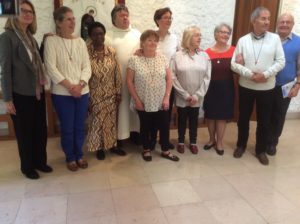 On 29 September-4 October 2017, the Superior General of the Order, Fr. Leocir Pessini, and Fr. Laurent Zoungrana, the Vicar General of the Order and general assistant of the Lay Camillian Family (LCF), visited the Camillian religious of the Province of France. They also took part in the celebrations for the twentieth anniversary of the foundation of the LCF in France: the meeting of friendship and fraternity was also an opportunity for the aggregation of new members
On 29 September-4 October 2017, the Superior General of the Order, Fr. Leocir Pessini, and Fr. Laurent Zoungrana, the Vicar General of the Order and general assistant of the Lay Camillian Family (LCF), visited the Camillian religious of the Province of France. They also took part in the celebrations for the twentieth anniversary of the foundation of the LCF in France: the meeting of friendship and fraternity was also an opportunity for the aggregation of new members
THE PROVINCE OF BURKINA FASO
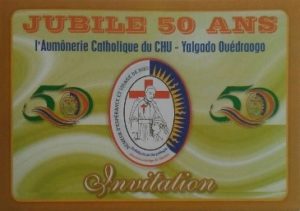 The religious of the Province of Burkina Faso have announced the solemn celebration (to be held on 12 November 2017) to commemorate the fiftieth anniversary of the arrival of the Camillians at the Catholic chaplaincy of the Yalgado Ouedraogo University Hospital of Ouagadougou (Burkina Faso).
The religious of the Province of Burkina Faso have announced the solemn celebration (to be held on 12 November 2017) to commemorate the fiftieth anniversary of the arrival of the Camillians at the Catholic chaplaincy of the Yalgado Ouedraogo University Hospital of Ouagadougou (Burkina Faso).
THE DELEGATION OF KENYA – PROVINCIA NORD ITALIANA
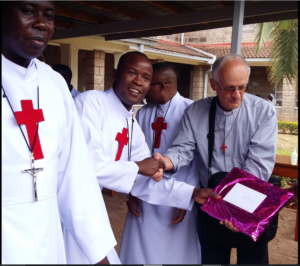 The celebration of the perpetual profession of three Camillian religious, Paul Kabito, Godfrey Wanyelo and Josphat Okemwa, took place on Saturday 30 September at the St. Camillus Seminary of Nairobi (Kenya). These religious were accepted definitively into the Order by the Provincial Delegate, Fr. Dominic Mwanzia. About thirty fellow concelebrants, and about two hundred faithful, took part, most of whom were relatives and parishioners of the three religious. The ceremony – as is usually the case in Africa – was rather lively and picturesque. It was followed by a lunch for everyone in the cloister of the seminary which was enlivened by music and dancing. There was no absence of gifts from relatives, fellow religious and friends.
The celebration of the perpetual profession of three Camillian religious, Paul Kabito, Godfrey Wanyelo and Josphat Okemwa, took place on Saturday 30 September at the St. Camillus Seminary of Nairobi (Kenya). These religious were accepted definitively into the Order by the Provincial Delegate, Fr. Dominic Mwanzia. About thirty fellow concelebrants, and about two hundred faithful, took part, most of whom were relatives and parishioners of the three religious. The ceremony – as is usually the case in Africa – was rather lively and picturesque. It was followed by a lunch for everyone in the cloister of the seminary which was enlivened by music and dancing. There was no absence of gifts from relatives, fellow religious and friends.
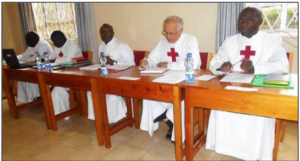 There was a delegation meeting at St. Camillus Mission Hospital comprising of Fr. Dominic the delegate of Kenya,Fr. Paul Guarise, Fr. Reuben, Fr. Julius Morara and Br. Bonaventure. On the same day in the evening, Fr. Paul found time to sit with the Camillian Family to brief them on what is expected of the group. The group which is an association of Christians moved by the charism of Camillians following the order of St. Camillus, he said, had the main objectives to practice works of mercy, promote culture of life and serve the sick.
There was a delegation meeting at St. Camillus Mission Hospital comprising of Fr. Dominic the delegate of Kenya,Fr. Paul Guarise, Fr. Reuben, Fr. Julius Morara and Br. Bonaventure. On the same day in the evening, Fr. Paul found time to sit with the Camillian Family to brief them on what is expected of the group. The group which is an association of Christians moved by the charism of Camillians following the order of St. Camillus, he said, had the main objectives to practice works of mercy, promote culture of life and serve the sick.
THE DELEGATION IN TANZANIA – THE PROVINCE OF GERMANY
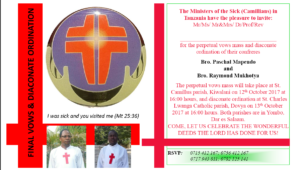 The religious of the Camillian Delegation in Tanzania have announced the solemn professions and ordination as deacons of Paschal Mapendo Kakule and Raymond Mukthotya which will be celebrated on 12 and 13 October 2017.
The religious of the Camillian Delegation in Tanzania have announced the solemn professions and ordination as deacons of Paschal Mapendo Kakule and Raymond Mukthotya which will be celebrated on 12 and 13 October 2017.
THE PROVINCE OF SPAIN
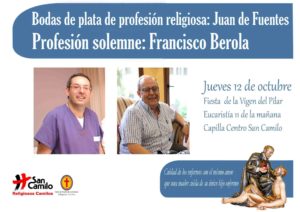 The Camillian religious of Spain and of the Delegation of Argentinian share their joy at the solemn religious profession of Francisco Berola and the twenty-fifth anniversary of the religious profession of Br. Juan de Fuentes which will be celebrated on Thursday 2017 on the feast day of ‘Our Lady of Pilar’ in the chapel of the ‘St. Camillus’ Centre of Tres Cantos, Madrid.
The Camillian religious of Spain and of the Delegation of Argentinian share their joy at the solemn religious profession of Francisco Berola and the twenty-fifth anniversary of the religious profession of Br. Juan de Fuentes which will be celebrated on Thursday 2017 on the feast day of ‘Our Lady of Pilar’ in the chapel of the ‘St. Camillus’ Centre of Tres Cantos, Madrid.
CADIS (Roma) 2017
 THE ‘HELP BIHAR – INDIA’ APPEAL
THE ‘HELP BIHAR – INDIA’ APPEAL
A campaign against water-borne diseases in the communities afflicted by flooding in four districts of Bihar in India (West Chamaparan, Sitamarhi, Muzafaurpur and Darbhanga) of the CAMILLIAN TASK FORCE (CTF) and CARITAS India
Health-care camps– flooding in the State of Bihar (India).
Dear friends, some States of India have been struck by flooding which has led to grave loss of human life and left entire populations in a state of great need.
The States most afflicted are Bihar, Assam and Uttar Pradesh. The situation of flooding in West Bengal and Assam is gradually getting better. The main rivers have broken their banks, new areas have been flooded, and this created thousands of displaced persons last weekend, washing away hundreds of huts, poor buildings, roads and bridges, generating at the same time incalculable damage.
At the present time all the main rivers are gradually returning to normal. The water level in all of the main rivers is going down and the floods are gradually getting better in Bihar. The local populations have been forced to flee their homes, finding shelter on high ground and school buildings and embankments. The number of deaths caused by the flooding in Bihar has risen to 514; the emergency has affected 1.7 million people in 21 districts of the State according to the initial estimates of the Department for Disaster Management.
Aware of the situation and the terrible living conditions of the poor people of Bihar, the Camillian Task Force (CTF), together with Caritas India, is immediately ready to respond to this disaster through the organization of medical aid camps in those areas of Bihar that have been most afflicted. We are planning to send our CTF medical aid team to Bihar on 4 September 2017.
CADIS – ANNUAL FORMATION MEETING (Bangkok, 5-15 November 2017)
The fourth annual conference on leadership of the Camillian Disaster International Service (CADIS) Foundation will be held on 5-15 November 2017 at the Camillian Pastoral Care Centre of Bangkok, Thailand. The subject of the meeting of this year for the coordinators and project managers of CAADIS will be ‘Reaffirming our Vision and Strengthening our Strategies for the Reconstruction of Resilient Communities’. During this conference the following topics will be addressed: 1) the management of the project cycle; 2) the drawing up of a proposal for a project; 3) the leadership of servants; and 4) the intermediate assessment of the CADIS strategic plan. The conference will be in English.
SCARICA QUI L’INVITO E IL PROGRAMMA
ROME – PONTIFICAL ACADEMY FOR LIFE
The Pontifical Academy for Life has organised a workshop on the subject: ‘Accompanying Life. New Responsibilities in the Technological Age’.
On 5-6 October 2017 the Pontifical Academy for Life held a workshop on ‘Accompanying Life. New Responsibilities in the Technological Age’. This took place in the context of the twenty-third general assembly of its members.
Our confrere Fr. Jacques SIMPORE, a Camillian religious from Burkina Faso and a lecturer in biology, animated a session on the subject ‘Technology at the Service of Justice’.
THE CAMILLIANUM (Rome) 2017
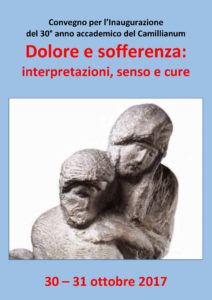 On 30-31 October 2017 a conference will be held to mark the inauguration of the thirtieth academic year of the Camillianum (the International Institute of the Theology of Pastoral Care in Health). Its subject will be:
On 30-31 October 2017 a conference will be held to mark the inauguration of the thirtieth academic year of the Camillianum (the International Institute of the Theology of Pastoral Care in Health). Its subject will be:
Pain and suffering: interpretations, meaning and treatment.
Cf. PROGRAMME OF THE CONFERENCE
CADIS – CAMILLIANUM (Roma) 2017
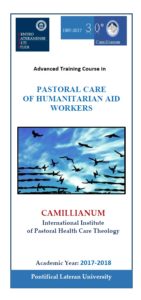 Course of High Formation in Pastoral Care for Humanitarian Workers
Course of High Formation in Pastoral Care for Humanitarian Workers
This course seeks to offer formation to humanitarian workers in the light of the words of Pope Francis on human suffering and his Motu proprio Humanam progressionem (the Dicastery for Promoting Integral Human Service) which asks for greater support for immigrants, the needy, the sick and the outcast, the marginalised and the victims of armed conflicts and natural disasters, people in prison, the unemployed and the victims of every kind of slavery and torture and people whose dignity is jeopardised.
The course will have 860 hours which will be divided into two parts: from 18 November to 9 December 2017 and from 26 February to 24 March 2018.
THE PROVINCE OF SICILY AND NAPLES
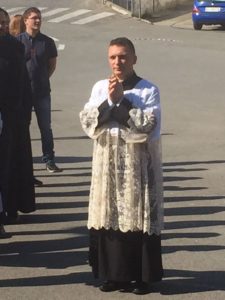 Called to have the same feelings as Jesus Christ (Phil 2:5)!
Called to have the same feelings as Jesus Christ (Phil 2:5)!
The priestly ordination of Fr. Salvatore Giuseppe Pontillo
On Saturday 30 September last, in the late afternoon, in the town of Grassano in the Province of Matera, our confrere SALVATORE PONTILLO was ordained a priest at the hands of the Bishop of Tricarico, Msgr. Giovanni Intini.
The celebration was an authentic ‘choral celebration of the people’: Salvatore chose to live this important moment of his life of consecration in his home parish, sharing great emotions with his family and the people who have seen him grow and mature as a man and as a Christian.
The priestly ordination was preceded and well prepared for by a week of ‘parish Camillian mission’ organised by the Camillian religious of the Province of Sicily and Naples, with the cooperation of religious from the Camillian Province of Rome, women religious of the Daughters of St. Camillus, and women Ministers of the Sick of St. Camillus and lay fellow workers. The week of mission was characterised by visits to sick people and families of the community of Grassano and to elderly people in their homes in the same town, and by moments of celebration and catechesis that described St. Camillus and the Camillian charism.
The welcome given to the new priest by the parish, by the Christian community and more in general by the families of Grassano was warm, spontaneous and very generous!
On Saturday afternoon the parish church was not large enough to hold all the priests, religious and faithful who through their fraternal and prayerful presence wanted to express their friendship with Salvatore.
The consecrating bishop – for the record Salvatore is the first deacon to have been ordained a priest by the ‘young’ bishop, Msgr. Intini – during his homily focused on the profound identity that a priest – who is a pastor and man of faith – must cultivate. He referred to passages from the liturgy of the consecration and to the second reading of the twenty-sixth ordinary Sunday, in particular the letter of St. Paul to the Philippians (Phil 2: 1-11).
‘Do you want to be ever more united to Christ the high priest, who as a pure victim offered himself up to the Father for us, consecrating yourself to God together with him for the salvation of all men?’
And the bishop went on: ‘Receive the offerings of the holy people for the Eucharistic sacrifice. Be aware that in what you do you imitate what you celebrate; conform your life to the mystery of the cross of Christ’.
The greatness of Christ who lived being the Son of God, freely and fully taking on humanity, the dimension of serving humanity unto humiliation and the cross, was also pointed out to Salvatore, as a permanent style of life and permanent conversion to live his Camillian consecration at the service of the poor, the sick, the needy…
Salvatore, much moved, thanked his family – in particular his father Domenico, deceased but an ‘unaware’ mediator of the Camillian vocation of his son – the Christian community of Grassano, his friends, and his Camillian confreres, expressing the hope that he would be continue to an ‘intense perfume leaving its scent wherever placed’ (St. Camillus), as his holy commemorative picture says.
 Many reasons led the Camillian religious to donate the stature of their Founder St. Camillus to the Hospital of St. Pio. First of all, because this saint has been offered by the Church as a model for, and the patron saint of, the sick and all health-care workers. Indeed, St. Camillus himself was sick because he was afflicted by five illnesses that tormented him for the whole of his life. They did not impede him, however, from caring, animated by heroic charity, for the sick of Rome and many other cities in Italy for almost forty years. In addition, the intention was to emphasise the many aspects of nearness and likeness between St. Camillus and St. Pio.
Many reasons led the Camillian religious to donate the stature of their Founder St. Camillus to the Hospital of St. Pio. First of all, because this saint has been offered by the Church as a model for, and the patron saint of, the sick and all health-care workers. Indeed, St. Camillus himself was sick because he was afflicted by five illnesses that tormented him for the whole of his life. They did not impede him, however, from caring, animated by heroic charity, for the sick of Rome and many other cities in Italy for almost forty years. In addition, the intention was to emphasise the many aspects of nearness and likeness between St. Camillus and St. Pio.
Apart from the fact that both of them were born on 25 May, it should be remembered that when St. Pio was sent to the religious house of San Giovanni he asked to be put in cell number 5 because four centuries previously it had accommodated for one night the young Camillus who would later become a saint.
THE DELEGATION OF TAIWAN
A diocesan priest from the continent of China, after meeting a religious of ours in the Philippines, came to our community in Taiwan for a visit of two weeks. His intention was to learn about our works, with a view to becoming a Camillian.
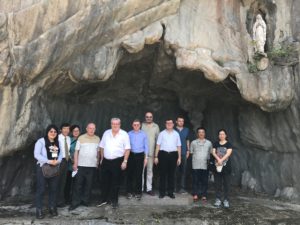 On 18 September, our confreres of the Central Economic Commission came to Lotung on a fraternal visit.
On 18 September, our confreres of the Central Economic Commission came to Lotung on a fraternal visit.
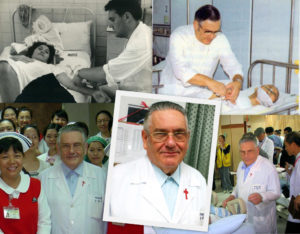 Davide Cattaneo, who was born in 1939 and has for a number of decades been a Camillian missionary in Taiwan (Lotung), was awarded this year on 13 September 2017 by the government of Taiwan the prestigious ‘good doctor’ award for his praiseworthy help for the sick, and in particular for his dedication in his service at our Camillian hospital, St. Mary’s.
Davide Cattaneo, who was born in 1939 and has for a number of decades been a Camillian missionary in Taiwan (Lotung), was awarded this year on 13 September 2017 by the government of Taiwan the prestigious ‘good doctor’ award for his praiseworthy help for the sick, and in particular for his dedication in his service at our Camillian hospital, St. Mary’s.
INTERNATIONAL MEETING OF CAMILLIAN PROVIDERS OF FORMATION AND ANIMATORS OF VOCATIONS
The international meeting of Camillian animators of vocations and providers of formation will be held on 12-18 October 2017 at the ‘Villa Primavera’ house of welcome of the Handmaids of the Incarnation, Rome,
The general subject of this international meeting is ‘The Camillian Promotion of Vocations and Formation in Harmony with the Signs of the Times and New Needs to Construct a Future of Hope’.
Principal objective: in communion, we seek an updating and a revitalisation of our visions, activities and instruments in the area of the Camillian promotion of vocations and formation.
Specific objectives:
1) To bring the Rules for Formation of the Order (2000) up to date.
2) To diagnose and learn about some of the characteristics of today’s young people in a globalised world.
3) To take interculturality into account in the process of vocational discernment and formation.
4) To facilitate exchange and thought about experiences involving the promotion of vocations and formation (the signs of hope, opportunities and challenges).
5) To foster knowing each other and fraternal being together amongst those taking part in this meeting
In our Camillian Project for a faithful and creative life: challenges and opportunities (2014-2020) it is said that ‘the future of the Order depends on the quality of the formation for candidates’ and in the operational recommendations about the three levels of formation (the formation of those who provide formation, initial formation and ongoing formation) we read as follows:
The formation of those providing formation: ‘Constitutes an absolute priority in which the Order is called to invest constantly. Their specific training, which should be not only academic (psycho-pedagogic) but also experiential and ministerial (pastoral and spiritual), is the best guarantee for the future itself of the Order. Whereas in the case of the promotion of vocations it is right to involve the youngest religious, for the field of formation religious should be co-opted who have had at least six years (two three-year periods) of community religious life lived in the practical implementation of the charism’.
Initial formation: ‘The important and delicate field of initial formation is perhaps the aspect that highlights in an unequivocal way the need for the unification of efforts and inter-Provincial cooperation and/or exchange with other Institutes, both to achieve a more effective optimisation of resources and to achieve a more complete formation of candidates’.
Ongoing formation: ‘It is necessary to define ongoing formation on the occasion of the fourth centenary, the jubilees for religious, but above all during the first ten years after perpetual profession. The creation of an ad hoc programme drawn up for continents or language areas constitutes a priority. This formation programme should contain imperative references to the link between the charism and spirituality, fraternity and the vow of poverty, and the capacity for witness to a sober life that respects the resources of the creation’.
In recent years the world of formation has witnessed a profound transformation in terms of methods, language, dynamics, values, purposes and stages. As Pope Francis observed: ‘One must always think in the people of God, inside it…We must not train administrators, managers, but fathers, brothers, travelling companions’; ‘formation is craft work, not police work’.
‘The adoption of their own Ratio Formationis has involved a major part of the Institutes in order to respond to new needs. However, one notes a notable divergence at the level of language, quality, and mystical wisdom. Even though they have been freshly produced, revision is needed of these handbooks which are copied from each other. This is specifically because the question of formation is a fundamental aspect for the future of consecrated life’ (cf. Congregazione per gli istituti di vita consacrata e le società di Vita Apostolica, Per vino Nuovo Otri Nuovi, Libreria Editrice Vaticana 2017, n. 34; ‘Congregation for Institutes of Consecrated Life and Societies of Apostolic Life, New Wineskins for New Wine, n. 34’).
Download here the Rule of Formation
DIARY OF THE SUPERIOR GENERAL AND THE GENERAL CONSULTA
On 29 September to 4 October of this year, Fr. Leocir Pessini and Fr. Laurent Zoungrana visited the Camillian religious of the Province of France.
On 16-27 October, the Superior General will visit the Camillian religious of the Delegation of North America (Milwaukee).
On 30-31 October, the Superior General will take part in the thirtieth academic year of the Camillianum (Rome).
DECEASED RELIGIOUS
‘See, now they vanish, the faces and places, with the self which, as it could, loved them. To become renewed, transfigured, in another pattern’ (T.S. Eliot).
 After a month of admission to hospital following a fall, and after being transferred to the St. Camillus Nursing Home of Cremona, on 2 October 2017 Brother Antonio Livi died aged eighty (the Province of North Italy). This Camillian religious belonged to the Camillian community of Genoa-Righi.
After a month of admission to hospital following a fall, and after being transferred to the St. Camillus Nursing Home of Cremona, on 2 October 2017 Brother Antonio Livi died aged eighty (the Province of North Italy). This Camillian religious belonged to the Camillian community of Genoa-Righi.
Download the complete obituary here.
 After being admitted to hospital for two months, and after being transferred to the RSA of Capriate S. Gervasio (Bg), on 3 October 2017 Brother Lodovico Pangrazzi died, aged 78 (the Province of North Italy).
After being admitted to hospital for two months, and after being transferred to the RSA of Capriate S. Gervasio (Bg), on 3 October 2017 Brother Lodovico Pangrazzi died, aged 78 (the Province of North Italy).
Download here the complete obituary.
‘‘Now they live in Christ whom they met in the Church, followed in our vocation, and served in the sick and the suffering. Trusting that the Lord, the Holy Virgin our Queen, St. Camillus, the Blessed Luigi Tezza, the Blessed Giuseppina Vannini, and our deceased religious brothers and sisters, will welcome them in their midst, we commend them in our prayers, remembering them with affection, esteem and gratitude’.
PRAYER FOR THE VICTIMS OF ALL TYPES OF DISASTERS
For all the victims of all types of disasters, for people who have lost their lives, for their loved ones, for the survivors, and for all those who work to provide help, we pray:
God in heaven, who has created and who preserves every existence,
You know all of our sadness and our suffering. May all the victims of all types of disasters be welcomed in your peace! Receive, we pray, in your mercy, our very many brothers and sisters buried by the forces unleashed by nature. Lead them to your home!
Comfort the pain of so many families, dry the tears of so many brothers and sisters, offer protection to the loneliness of so many orphans. Instill courage into everyone so that pain is transformed into a journey of growth and hope.
Generate in the hearts of Christians and all men and women of good will the wish to act so that the wounded and those who suffer because of these calamities experience the comfort of fraternal solidarity.
You who live and reign for ever and ever.
Amen.
Our Father – Hail Mary – Glory



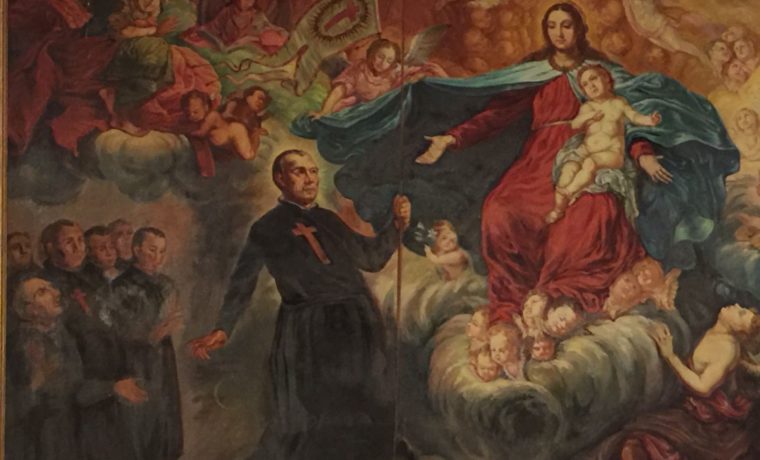
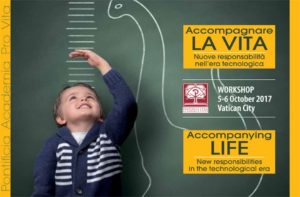

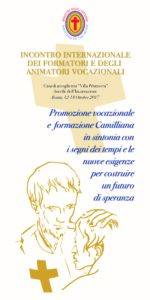
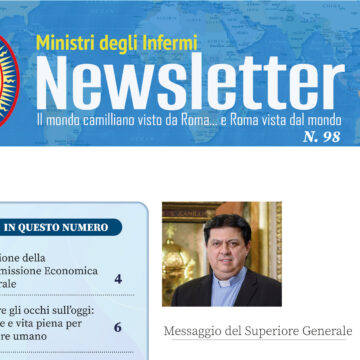
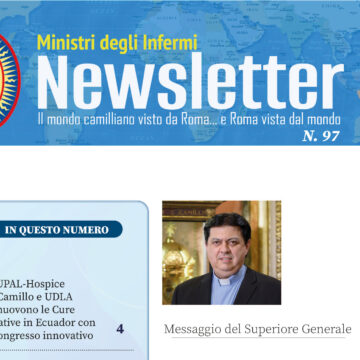


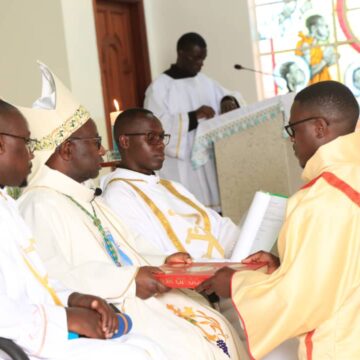
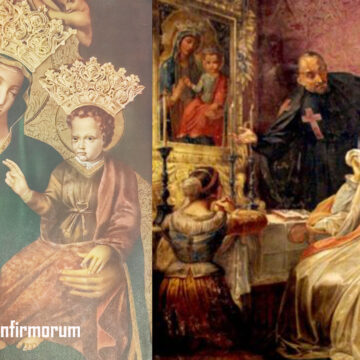

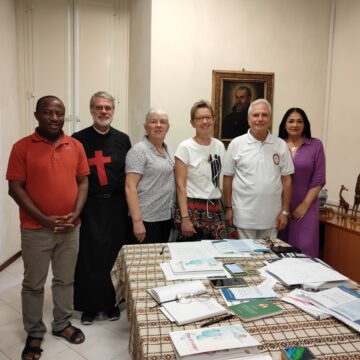

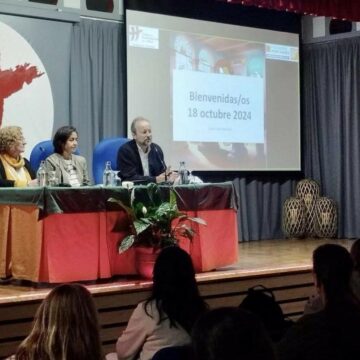
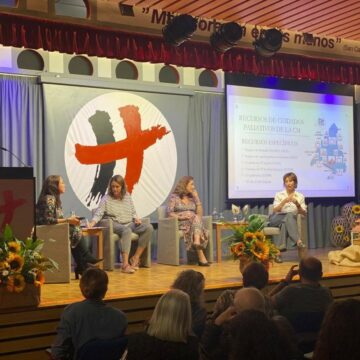
Camillians on Facebook
Camillians on Twitter
Camillians on Instagram